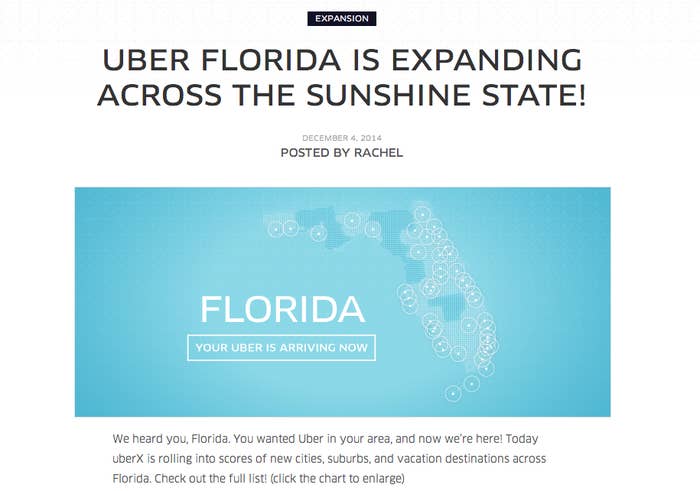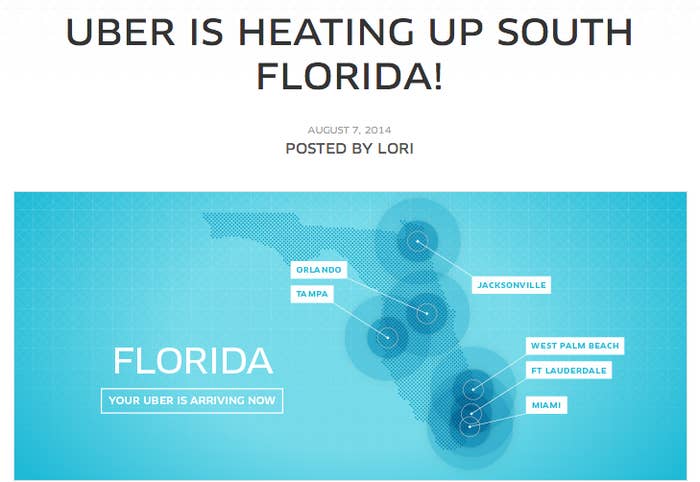
Just because Uber is everywhere doesn't mean it's always legal.
Currently, Uber is available in 52 countries. The transit behemoth's empire is vast, expanding from the Americas to Europe, Middle East, and Africa and it's quickly making its way through the Asia-Pacific. "Available locally, expanding globally," the company's locations landing page reads.
But even as the company, most recently valued at $41 billion, makes its way to the Asia-Pacific it continues to fight regulatory battles in the locations it is already operating in — whether legally or illegally.
Most recently, New Delhi, Thailand, and Spain banned the service. In the United States, where Uber had its beginnings, a number of cities have either issued cease-and-desist letters to Uber and its rival company Lyft or have even gone as far as suing them. Earlier this week, Portland, Oregon, filed a law suit against the company for operating illegally within city limits, in addition to issuing a cease-and-desist and citing and fining drivers caught operating a vehicle for Uber. Shortly after, the district attorneys of both Los Angeles and San Francisco also filed a civil consumer protection suit against the company.
Often, Uber has reacted to regulatory limitations on their global expansion in much the same way — by operating anyway. And many city bureaucrats, after claiming to have made every attempt to work with Uber and Lyft on finding ways to allow them to operate legally, move quickly to stop the company.
The company's move to Tampa, Florida, for example, began the way most of Uber's expansion into new cities do. Uber began operating illegally, which led to driver citations. Uber continued to operate, and the city attempted to negotiate with the company.
Since Uber X and Lyft launched in Tampa in April, the Hillsborough County Public Transportation Commission has been attempting to work out a deal with the companies to no avail, PTC Executive Director Kyle Cockream told BuzzFeed News.
"To date we made no headway with either company," Cockream said. "They're both operating illegally currently and we are still enforcing specific state laws against them that comes in the form of ticketing their drivers."
But the PTC has, in its own words, been "bending over backwards" short of throwing out its laws to accommodate Uber and Lyft, he said.
"We started this campaign taking the high road, I'm very proud of that," Cockream continued. "We contacted the companies, we asked them to cease and desist, we told them ways to become legal and what they could do for their drivers to become legal. We were open to suggestions to amend any rules to try to accommodate them somehow and additionally our campaign was simple. First, we contacted drivers to tell them what they're doing is illegal and here's why."
The PTC offered to buy and provide a $12,000 fingerprinting machine so that drivers could just walk in, in order to ensure the proper background checks were being performed. "Lyft didn't respond and Uber said, 'No, we don't think you should have to incur that in your budget.' That's not for them to say," he told BuzzFeed News.
Each illegally operating driver, Cockream said, receives three citations, which collectively comes out to $700. Additionally, Uber and Lyft also receive a citation for aiding and abetting each of the drivers. To date, 115 drivers have received three citations for: operating a public vehicle without certification, unlawful operation, and not having proper insurance. For each of those drivers, Uber and Lyft are cited for operating unlawfully without a public license.
"Lyft has just hired a local attorney to start representing them. We wrote tickets to Uber Technologies Inc. several months ago but they appealed those citations directly," Cockream said.
Uber lost the first two rounds of appeals and just filed a third and final appeal in the fourth District Court of Appeals — the wrong district, a move that's frustrated Cockream and the PTC.
"They filed in the wrong court ... they're supposed to file in the second district court of appeals," Cockream said. "We don't know what the motive behind that is. The firm representing Uber is a relatively reputable firm here in Florida ... and that's like a first-year law student mistake."

But now Tampa authorities are at standstill. With little cooperation from the state attorney and two months of radio silence from Uber, the city has just been continuously citing drivers, but with very little effect.
In addition to citing both the company and the driver, for each citation, the PTC files a criminal misdemeanor charge at the State Attorney's Office. However, so far, no action has been taken.
"The first bunch of [the criminal charges] the [State Attorney's Office] decided to dismiss," he said. "They didn't tell us."
As for the remaining cases, the State Attorney's Office has been lobbying back and forth with the PTC, saying they need more information.
"I was a cop of 29 years, so is everyone else in this department," Cockream said. "Collectively we've seen tens of thousands of misdemeanor cases between all of us. This is kind of like elementary-level stuff. We're pretty confident we checked all the boxes."
This has been happening for what Cockream estimates is about four months now. Uber, he points out, also ceased communicating with the PTC two months ago.
"We suspect they're just going to Tallahassee and throwing a lot of money at lobbyists," he said.
When asked whether he thinks the state attorney's treatment of the criminal charges and Uber's lack of communications had anything to do with each other, Cockream paused: "Our state's attorney is an elected official. I cannot answer yes to that without having something concrete to give you. But I know there's a whole lot more to the story on that issue," he said.
